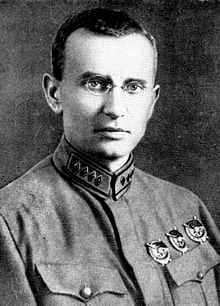Jeronimas Uborevičius
Ieronim Uborevich ( Russian Иероним Петрович Уборевич Ijeronim Petrovich Uborevich ., Scientific transliteration Ieronim Petrovič Uborevič ; born January 2, jul. / 14. January 1896 greg. In Antandrija , Kovno Governorate ; † 12. June 1937 in Moscow ) was a Soviet politician and General of the Red Army .
Life
Jeronimas, who comes from a Lithuanian farming family, attended secondary school in Dünaburg from 1909 . He left this in 1914 with a gold medal and studied mechanics at the Petrograd Polytechnic until 1915 . In the spring of 1916 he became a lieutenant in the Petrograd Artillery School and served in the 15th Artillery Division in the First World War .
In March 1917 Uborevich joined the RSDLP (B) . As the commander of a unit of the Red Guard , he was wounded in the fight against the Romanians and Austrians in Bessarabia in February 1918 and was taken prisoner.
During the civil war , the Bolshevik fought in the fall of 1919 in the Orjol Governorate and in the Tula Governorate against the whites under Mai-Majewski and Alexander Kutepow . In the late winter of 1920 Uborevich defeated Denikin's army on the Kuban and captured Krivoy Rog , Kherson , Nikolaev and Odessa . In the early spring of 1920 he stormed Jekaterinodar , took Novorossiysk and thus hindered the orderly retreat of the whites to the Crimea . As commander of the 14th Army on the Southwest Front, he expelled the Poles from Vinnitsa , Schmerynka and Mogilew-Podolski in 1920 . In June 1920 Uborevich fought against Wrangel's Russian army in the Crimea . From late autumn 1920 to spring 1921 he suppressed peasant revolts in Ukraine and Belarus . Ultimately, Uborevich led the 5th Army in the Far Eastern Republic and the People's Revolutionary Army there from August 1921 to August 1922.
After the civil war, Uborevich worked from June 1924 to January 1925 as Chief of the General Staff in the Ukrainian Military District and then commanded the North Caucasian Military District until November 1927 . From August 1926 to June 1934 he was a member of the Revolutionary War Council . 1927–1928 Uborewitsch was posted to Germany for thirteen months to study and completed the Reichswehr leadership training in Berlin . After returning to the Soviet Union, he pleaded for the further mechanization of the Red Army based on the model of the Reichswehr. From November 1928 to November 1929 Uborevich was head of the Moscow Military District. He was then responsible for armaments in the Red Army until June 1931, and in this position studied the German armaments industry in 1930 . Then Uborevich took over the Belarusian military district as commanding general until May 20, 1937.
On the XVI. At the CPSU Congress , Uborevich became a candidate of the Central Committee of this party and since January 1932 he was a member of the Central Committee of the CPSU of Belarus.
Uborevich said Defense Minister Voroshilov was not up to the demands of the next war. Stalin was on the side of his defense minister. Uborewitsch was appointed commanding general of the Central Asian Military District and arrested on May 29, 1937 on the way there, accused, convicted and shot as part of the Stalin Purges , also known as the Great Terror . His wife Nina was imprisoned as a family member of a traitor to the country and shot in October 1941. Wladimira , their daughter, who was born on February 14, 1924 in Chita , was raised in the orphanage from 1937 to 1941, sentenced to five years in a camp in 1944 and released in 1947.
During the Khrushchev thaw in 1955, Vladimira and her parents were rehabilitated in 1957.
Honors
- 1919, 1920, 1922 Order of the Red Banner
- 1920 Revolutionary Honor Weapon
- Streets bear Uborevich's name in
- Russia in Vladivostok , Novodvinsk , Plesezk , Tambov , Khabarovsk ,
- Ukraine in Donetsk , Khmelnitsky , Kiev (2 streets), Kharkov ,
- Belarus in Minsk , Baranavichy .
Web links
- 2011 p. Je. Lazarev: The rise and fall of the military leader Uborewitsch 6 pages .pdf (Russian)
- DG Simonow Entry in the Siberian Encyclopedia (Russian)
- Short biography (Russian)
- Entry at hrono.ru (Russian)
Remarks
- ↑ Kovno governorate: today Utena district municipality .
- ↑ Soviet law from the years 1925 and 1935 on the procedure with family members of a traitor to the fatherland (Russian Член семьи изменника Родины ).
Individual evidence
- ^ Russian Artillery School Konstantinowski
- ↑ Russian battles in the Orjol and Tula governorates
- ^ Russian Russian Army Wrangel
- ^ Russian 5th Army of the Red Army
- ^ Russian Revolutionary People's Army of the Far Eastern Republic
- ↑ Russian Ukrainian military district
- ^ Russian North Caucasian military district
- ^ Francis Ludwig Carsten: Reichswehr and Politics, 1918–1933 , Kiepenheuer & Witsch, 1964, p. 309. ( limited preview on Google Book Search ).
- ↑ Russian Moscow Military District
- ↑ Russian Belarusian military district
- ↑ Russian XVI. Party congress of the CPSU
- ^ Russian Central Asian military district
- ↑ Russian Vladimira Uborewitsch
| personal data | |
|---|---|
| SURNAME | Uborevičius, Jeronimas |
| ALTERNATIVE NAMES | Уборевич, Иероним Петрович (Russian spelling); Uborevich, Ijeronim Petrovich; Uborevich, Ieronim Petrovich; Jeronim Petrovich Uborevich |
| BRIEF DESCRIPTION | Soviet military leader and politician |
| DATE OF BIRTH | 1896 |
| PLACE OF BIRTH | Antandrija , Kovno Governorate |
| DATE OF DEATH | June 12, 1937 |
| Place of death | Moscow |
